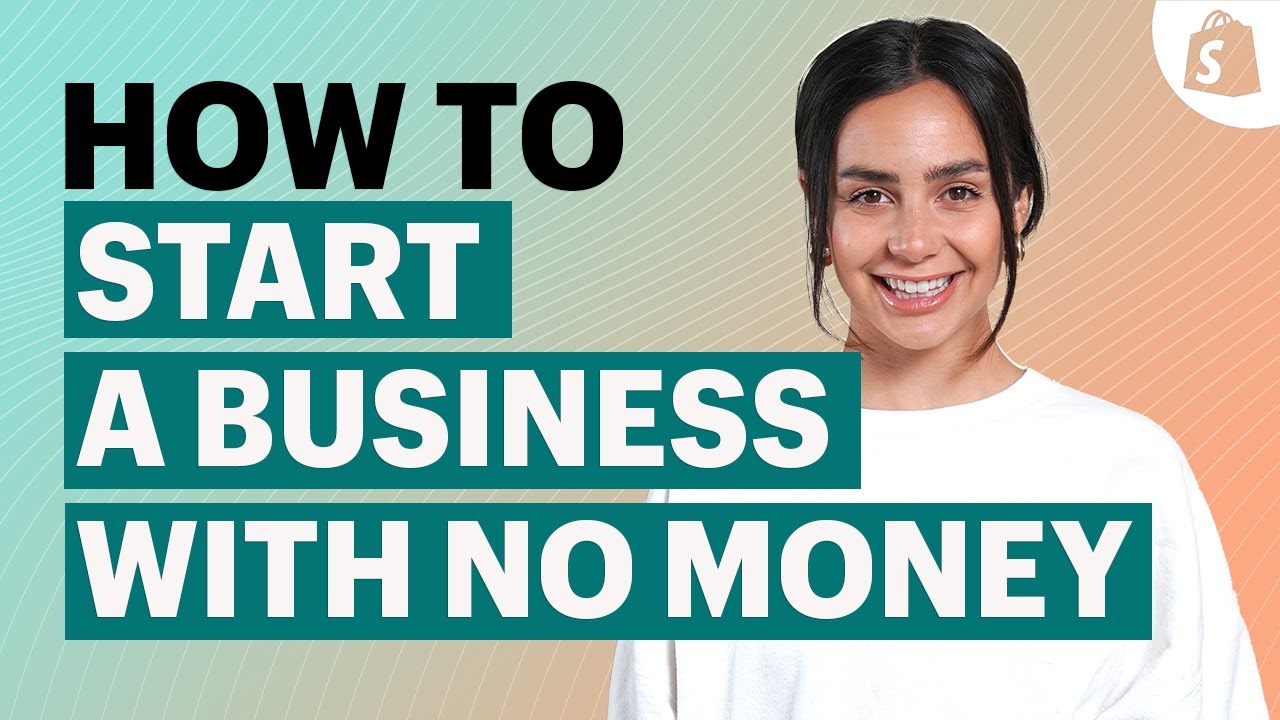Start a business with no money by leveraging free resources and focusing on skills you already possess. Utilize online platforms to market and grow your business.
Starting a business without any initial capital might seem daunting, but it’s entirely possible with the right approach. Begin by identifying your skills and talents that can be monetized. Use free resources like social media, free website builders, and online marketplaces to promote your services or products.
Network with potential clients and partners through online forums and local events. Bootstrap your business by reinvesting any initial earnings back into it. By being resourceful and strategic, you can build a successful business from the ground up without needing significant financial investment.
Finding A Business Idea
Starting a business with no money is challenging but possible. The first step is finding the right business idea. A well-thought-out idea can transform into a successful venture. This section will guide you on how to find that perfect business idea.
Identifying Skills
Start by identifying your skills. What are you good at? List down all your strengths. This list will help you find a business idea that aligns with your abilities.
- Make a list of your skills.
- Highlight the skills you enjoy using.
- Consider skills that others often ask you to help with.
For example, if you are good at writing, you can start a blog or offer freelance writing services. If you excel at organizing, consider starting a virtual assistant business.
Market Research
After identifying your skills, conduct market research. Research helps you understand what people need and are willing to pay for. Start by identifying your target audience. Who will benefit from your skills?
- Use online tools like Google Trends to see what’s popular.
- Join forums and social media groups related to your skills.
- Survey potential customers to understand their needs.
Look at your competitors. What are they offering? How can you differentiate yourself? Find a niche market that is underserved. This can help you stand out and attract customers.
| Tool | Use |
|---|---|
| Google Trends | Identify popular topics |
| Facebook Groups | Engage with your target audience |
| SurveyMonkey | Conduct customer surveys |
By combining your skills with thorough market research, you can find a business idea that has potential for success. Remember to stay flexible and open to refining your idea based on feedback and insights.
Leverage Free Resources
Starting a business with no money might seem impossible. But by leveraging free resources, you can turn your dream into reality. This section will guide you on how to utilize various free resources available online and within your community.
Online Courses
Many platforms offer free online courses that cover essential business skills. Websites like Coursera, Udemy, and Khan Academy provide courses on marketing, finance, and entrepreneurship.
- Coursera: Offers courses from top universities.
- Udemy: Provides practical skills through hands-on tutorials.
- Khan Academy: Great for learning the basics of economics and finance.
These courses can help you gain knowledge without spending any money. They often include video lectures, quizzes, and reading materials.
Community Programs
Your local community is a valuable resource. Many towns and cities have programs that support new businesses.
| Program | Description |
|---|---|
| Small Business Development Centers (SBDCs) | Offer free consulting and training for new businesses. |
| Chambers of Commerce | Provide networking opportunities and local business resources. |
Joining these programs can provide you with mentorship, networking, and even potential funding opportunities. They can also guide you through the initial steps of setting up your business.
Building A Business Plan
Starting a business with no money is challenging but possible. A solid business plan is essential. It acts as your roadmap, guiding you through each step. This section will help you build a strong business plan. We will cover Setting Goals and Budget Planning.
Setting Goals
Goals give your business direction. They help you stay focused and motivated. Start by setting SMART goals. These are Specific, Measurable, Achievable, Relevant, and Time-bound.
- Specific: Clearly define what you want to achieve.
- Measurable: Ensure you can track your progress.
- Achievable: Set realistic goals you can accomplish.
- Relevant: Ensure your goals align with your business vision.
- Time-bound: Set deadlines for achieving your goals.
Write down your goals. Review them regularly. Adjust as needed to stay on track.
Budget Planning
A budget plan helps you manage your finances. Even without money, budgeting is crucial. It helps you identify what you need and where to find resources.
Start by listing essential items and their costs. Use a table to organize your budget plan:
| Item | Estimated Cost |
|---|---|
| Website Hosting | $10/month |
| Marketing | $50/month |
| Supplies | $30/month |
Look for free or low-cost alternatives. For example, use free marketing tools like social media. Consider barter services. Exchange skills or products with other businesses.
Track your expenses. Keep your budget updated. This helps you stay financially healthy and focused on your goals.

Credit: www.linkedin.com
Networking And Partnerships
Starting a business with no money may seem impossible. Yet, leveraging networking and partnerships can make it achievable. Building strong connections opens up resources, advice, and opportunities. Here’s how networking and partnerships can help your business thrive.
Joining Groups
Joining business groups is a great way to network. Look for local business associations or online communities. These groups often have experienced members. They can provide valuable insights and support. Attend meetings and be active in discussions.
Here is a table showing some types of groups to consider:
| Group Type | Benefits |
|---|---|
| Chambers of Commerce | Local business networking and resources |
| Online Forums | Access to global business advice |
| Industry Associations | Specific industry trends and opportunities |
Collaborating With Others
Collaboration can help you grow your business without much money. Partner with other small businesses. Share resources and expertise to save costs. For example, you can share office space or marketing efforts.
Here are some ways to collaborate:
- Joint marketing campaigns
- Shared office spaces
- Co-hosting events
Collaboration can lead to mutual growth. Always seek partners with similar goals. This ensures a fruitful relationship for both parties.
Bootstrapping Techniques
Starting a business with no money can feel challenging. Bootstrapping techniques can help you achieve this goal. These methods rely on existing resources. You can start small and scale gradually.
Using Personal Assets
One effective way to bootstrap is by using personal assets. This includes items you already own. You can sell these items to raise capital. It can be anything from electronics to furniture.
Consider using your home as an office. This saves you from renting a commercial space. You can also use your car for deliveries or meetings. This reduces transportation costs.
Here’s a table of common personal assets you can use:
| Asset | Usage |
|---|---|
| Home | Office space |
| Car | Transportation |
| Electronics | Sell for cash |
Trading Services
Trading services is another bootstrapping technique. This involves offering your skills. In return, you get services or goods you need.
For example, you can offer web design services. In return, you might receive accounting help. This mutual exchange benefits both parties.
Here’s a list of services you can trade:
- Web design
- Social media management
- Copywriting
- Graphic design
This approach helps you build valuable networks. It also saves money and resources.
Utilizing Social Media
Social media can help you start a business with no money. It’s a powerful tool for reaching a wide audience. You can use platforms like Facebook, Instagram, and Twitter to grow your brand. Creating content and engaging with your audience are key steps. Here’s how you can do it:
Creating Content
Creating engaging content is crucial. It attracts followers and keeps them interested. You can share posts, images, and videos. Make sure your content is relevant to your business. Use attractive visuals and clear messages. Consistency is important, so post regularly. Here are some content ideas:
- Behind-the-scenes photos
- Customer testimonials
- How-to guides
- Product showcases
You can also use content calendars. They help in planning your posts. Tools like Hootsuite or Buffer can assist in scheduling. Always use hashtags to increase visibility. This helps in reaching a larger audience.
Engaging With Audience
Engaging with your audience builds trust. It makes them feel valued. Respond to comments and messages promptly. Ask questions to encourage interaction. Host live sessions and Q&A’s. Create polls and surveys to get feedback.
Here are some tips for effective engagement:
- Reply to comments within 24 hours
- Share user-generated content
- Thank your followers for their support
- Run contests and giveaways
Engagement is a two-way street. It’s not just about posting content. It’s also about listening to your audience. Use their feedback to improve your services. This builds a loyal customer base. And it helps in growing your business.
Crowdfunding And Grants
Starting a business without money is possible. Crowdfunding and grants are great ways to fund your dream. These options can help you get the funds you need.
Creating Campaigns
Crowdfunding allows you to raise money from many people. You can create a campaign on websites like Kickstarter or GoFundMe.
Here are the steps to create a successful campaign:
- Set a clear goal for your funding.
- Share your story and why you need funds.
- Offer rewards for backers who support you.
- Promote your campaign on social media.
Creating a video can make your campaign more engaging. Show your passion and explain your business idea clearly. Thank your backers and keep them updated.
Applying For Grants
Grants are funds given by organizations to help businesses. Unlike loans, you don’t have to pay back grants.
To apply for grants, follow these steps:
- Research available grants in your industry.
- Check the eligibility criteria.
- Prepare a strong application.
- Submit all required documents before the deadline.
Many grants are available for small businesses and startups. Look for grants from government agencies, non-profits, and private organizations.
Here is a simple table to compare crowdfunding and grants:
| Feature | Crowdfunding | Grants |
|---|---|---|
| Source | Public Donations | Organizations |
| Repayment | No | No |
| Application | Campaign | Formal Application |
Both crowdfunding and grants can provide the funds you need. Choose the option that works best for your business.

Credit: schoolforstartups.com
Starting Small And Scaling
Starting a business with no money can seem impossible. But it is not. By starting small and scaling, you can grow your business gradually. This approach helps manage risks and maximizes resources effectively.
Minimal Viable Product
A Minimal Viable Product (MVP) is the simplest version of your product. It includes only the core features. This helps you enter the market quickly and gather feedback.
Here are steps to create an MVP:
- Identify the core problem your product solves.
- List the essential features needed to solve this problem.
- Build a basic version of your product with these features.
- Launch your MVP to a small group of users.
- Collect feedback and make improvements.
Reinvesting Profits
Reinvesting profits is crucial for growth. It means using your earnings to improve your business. This can include upgrading equipment, marketing, or hiring staff.
Here is a simple table to show how you can reinvest profits:
| Profit Amount | Reinvestment Area |
|---|---|
| $100 | Marketing |
| $500 | New Equipment |
| $1000 | Hiring Staff |
Reinvesting profits helps your business grow steadily. It ensures you use your resources wisely and strategically.

Credit: www.youtube.com
Frequently Asked Questions
What Is The Easiest Business To Start With No Money?
Starting a service-based business, like freelancing or consulting, is easiest with no money. Utilize your skills and network.
How Do I Start A Business If I Don’t Have Money?
Start a business by offering services or freelancing. Leverage free online tools and social media for marketing. Bootstrap and reinvest profits. Seek small loans or grants. Collaborate with partners.
How To Start A Business With Only $100?
Start with a simple business idea. Use free online resources. Leverage social media for marketing. Network and seek free advice. Reinvest profits.
How To Start A Business From Zero?
To start a business from zero, identify a niche, create a business plan, secure funding, and market your product. Build a strong online presence and network with industry professionals.
Conclusion
Starting a business with no money is challenging but possible. Utilize free resources, leverage your skills, and build a strong network. Stay persistent, adaptable, and creative in finding solutions. With determination and smart strategies, you can turn your business dreams into reality.
Remember, success often starts with a single step.

Luke Mahomet has established herself as a prominent figure in the realm of tips and tricks expertise, showcasing a unique talent for distilling practical insights and solutions across various domains. With a diverse background and an innate curiosity for efficiency and effectiveness, Luke Mahomet has become a trusted source for valuable tips and tricks that span personal development, productivity, and life hacks. Her career is marked by a commitment to simplifying complexities and empowering individuals with actionable advice. Luke Mahomet’s ability to offer practical solutions to everyday challenges, coupled with a knack for uncovering hidden gems of wisdom, has earned her a dedicated following. As a tips and tricks expert, she continues to be a guiding force, helping others navigate the nuances of life and work with practical and inventive solutions that make a meaningful impact.


